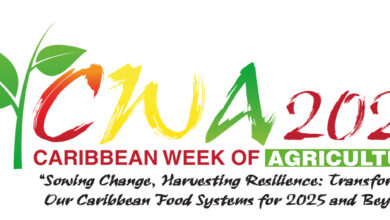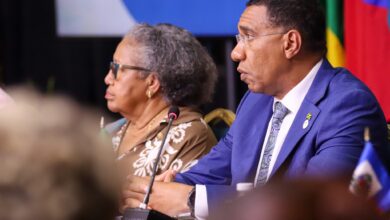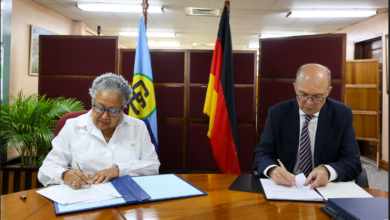The Fourth Meeting of the Project Advisory Group (PAG) for the European Union-funded project on “Strengthening the Institutional Response to HIV/AIDS/STI in the Caribbean” (SIRHASC) was held in Georgetown, Guyana on 15 February 2002. The Meeting was convened under the chairmanship of Assistant Secretary-General, Human and Social Development, Dr. Edward Greene who is also the Deputy Regional Authorising Officer (DRAO) for the Project. This project which has a budget of approximately 6.9 million Euros and an estimated duration of three years, aims to reduce the spread and impact of HIV and AIDS in the fifteen CARIFORUM Member States. It is executed by the CARICOM Secretariat in collaboration with five (5) Implementing Agencies which are the Caribbean Epidemiology Centre (CAREC), the Caribbean Health Research Council (CHRC), the Caribbean Regional Network of People Living with HIV/AIDS (CRN+), the University of the West Indies (UWI) and the Joint United Nations Programme on HIV/AIDS (UNAIDS).
As its main focus, the Meeting considered and recommended for approval, the Work Programme and Cost Estimates (WP & CE) for the period 1 May to 31 December 2002, which amount to approximately 1.7 million United States dollars. In discharging this responsibility, the Meeting suggested ways of enhancing the Work Programme, which includes the following important activities:
(i) Awarding regional and international scholarships to increase to pool of skilled personnel.
(ii) Appointment of Country Programme Advisors (CPA) in the Dominican Republic, Guyana and Haiti to assist those national governments with policy formulation and implementation.
(iii) Acquisition of equipment in order to support the prevention of Mother to Child Transmission (MTCT)
(iv) Supporting the national networks of People Living with HIV/AIDS in Guyana, Haiti and Jamaica.
(v) Convening sensitisation seminars and workshops for leaders and key personnel in various sections of society e.g. business, unions, healthcare providers and the media.
The Meeting also reviewed project implementation over the six-month period July to December 2001, and used the lessons learnt to inform decisions about future courses of action.
The Meeting noted with appreciation, the European Commission's approval of the CARICOM Secretariat's proposal for a four-month “no-cost” extension of the validity period of the current Work Programme, from 31 December 2001 to 30 April 2002. The PAG at its Third Meeting in Port-of-Spain, Trinidad & Tobago, on 26 October 2001 had endorsed the CARICOM Secretariat's proposal, the objective of which was to ensure completion of all the activities under the Work Programme. The Project Manager, Mr. Carl Browne, seized the opportunity to reiterate the European Commission's commitment to the successful implementation of the Project and their readiness to assist in whatever way they could.
While considering the responsibilities of the PAG, and the competencies necessary to discharge those responsibilities, the Meeting sought to refine and articulate the criteria for membership of the Group. The current members are the Caribbean Council of Churches (CCC), the Pan-American Health Organisation (PAHO), the Caribbean Development Bank, the United Nationals Development Programme and representatives from national governments. The Implementing Agencies are usually invited to attend Meetings of the Group.





